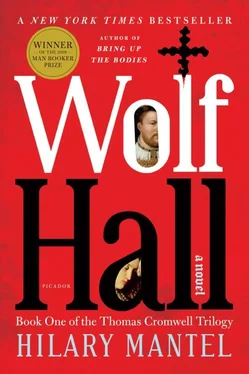Audley had said, ‘Prisoner, the court will ask the king to make grace upon you, as to the manner of your death.’ Audley had leaned across: Master Secretary, did you promise him anything? On my life, no: but surely the king will be good to him? Norfolk says, Cromwell, will you move him in that regard? He will take it from you; but if he will not, I myself will come and plead with him. What a marvel: Norfolk, asking for mercy? He had glanced up, to see More taken out, but he had vanished already, the tall halberdiers closing rank behind him: the boat for the Tower is waiting at the steps. It must feel like going home: the familiar room with the narrow window, the table empty of papers, the pricket candle, the drawn blind.
The window rattles; it startles him, and he thinks, I shall bolt the shutter. He is rising to do it when Rafe comes in with a book in his hand. ‘It is his prayer book, that More had with him at the last.’
He examines it. Mercifully, no blood specks. He holds it up by the spine and lets the leaves fan out. ‘I already did that,’ Rafe says.
More has written his name in it. There are underlinings in the text: Remember not the sins of my youth. ‘What a pity he remembered Richard Riche's.’
‘Shall I have it sent to Dame Alice?’
‘No. She might think she is one of the sins.’ The woman has put up with enough. In his last letter, he didn't even say goodbye to her. He shuts the book. ‘Send it to Meg. He probably meant it for her anyway.’
The whole house is rocking about him; wind in the eaves, wind in the chimneys, a piercing draught under every door. It's cold enough for a fire, Rafe says, shall I see to it? He shakes his head. ‘Tell Richard, tomorrow morning, go to London Bridge and see the bridge-master. Mistress Roper will come to him and beg her father's head to bury it. The man should take what Meg offers and see she is not impeded. And keep his mouth shut.’
Once in Italy, when he was young, he had joined a burial party. It isn't something you volunteer for; you're just told. They had bound cloth across their mouths, and shovelled their comrades into unhallowed ground; walked away with the smell of putrefaction on their boots.
Which is worse, he thinks, to have your daughters dead before you, or to leave them to tidy away your remains?
‘There's something …’ He frowns down at his papers. ‘What have I forgotten, Rafe?’
‘Your supper?’
‘Later.’
‘Lord Lisle?’
‘I've dealt with Lord Lisle.’ Dealt with the river Humber. With the slanderous priest from Mary Woolchurch; well, not dealt with him, but put him in the pending pile. He laughs. ‘You know what I need? I need the memory machine.’
Guido has quit Paris, they say. He has scuttled back to Italy and left the device half built. They say that before his flight for some weeks he had neither spoken nor eaten. His well-wishers say he has gone mad, awed by the capacities of his own creature: fallen into the abyss of the divine. His ill-wishers maintain that demons crawled out of the crannies and crevices of the device, and panicked him so that he ran off by night in his shirt with not even a crust and a lump of cheese for the journey, leaving all his books behind him and his magus's robes.
It is not impossible that Guido has left writings behind in France. For a fee they might be obtained. It is not impossible to have him followed to Italy; but would there be any point? It is likely, he thinks, that we shall never know what his invention really was. A printing press that can write its own books? A mind that thinks about itself? If I don't have it, at least the King of France doesn't either.
He reaches for his pen. He yawns and puts it down and picks it up again. I shall be found dead at my desk, he thinks, like the poet Petrarch. The poet wrote many unsent letters: he wrote to Cicero, who died twelve hundred years before he was born. He wrote to Homer, who possibly never even existed; but I, I have enough to do with Lord Lisle, and the fish traps, and the Emperor's galleons tossing on the Middle Sea. Between one dip of the pen, Petrarch writes, ‘between one dip of the pen and the next, the time passes: and I hurry, I drive myself, and I speed towards death. We are always dying – I while I write, you while you read, and others while they listen or block their ears; they are all dying.’
He picks up the next batch of letters. A man called Batcock wants a licence to import 100 tuns of woad. Harry Percy is sick again. The authorities in Yorkshire have rounded up their rioters, and divided them into those to be charged with affray and manslaughter, and those to be indicted for murder and rape. Rape? Since when do food riots involve rape? But I forget, this is Yorkshire.
‘Rafe, bring me the king's itinerary. I'll check that and then I'm finished here. I think we might have some music before we go to bed.’
The court is riding west this summer, as far as Bristol. The king is ready to leave, despite the rain. They will depart from Windsor, then to Reading, Missenden, Abingdon, moving across Oxfordshire, their spirits lifting, we hope, with the distance from London; he says to Rafe, if the country air goes to work, the queen will return with a big belly. Rafe says, I wonder the king can stand the hope each time. It would wear out a lesser man.
‘If we ourselves leave London on the eighteenth, we can aim to catch up with them at Sudely. Will that work?’
‘Better leave a day earlier. Consider the state of the roads.’
‘There won't be any short cuts, will there?’ He will use no fords but bridges, and against his inclination he will stick to the main roads; better maps would help. Even in the cardinal's day he was asking himself, might this be a project we could undertake? There are maps, of a kind; castles stud their fields, their battlements prettily inked, their chases and parks marked by lines of bushy trees, with drawings of harts and bristling boar. It is no wonder Gregory mistook Northumbria for the Indies, for these maps are deficient in all practical respects; they do not, for example, tell you which way is north. It would be useful to know where the bridges are, and to have a note of the distance between them. It would be useful to know how far you are from the sea. But the trouble is, maps are always last year's. England is always remaking herself, her cliffs eroding, her sandbanks drifting, springs bubbling up in dead ground. They regroup themselves while we sleep, the landscapes through which we move, and even the histories that trail us; the faces of the dead fade into other faces, as a spine of hills into the mist.
When he was a small child, six years old or about that, his father's apprentice had been making nails from the scrap pile: just common old flat-heads, he'd said, for fastening coffin lids. The nail rods glowed in the fire, a lively orange. ‘What for do we nail down the dead?’
The boy barely paused, tapping out each head with two neat strokes. ‘It's so the horrible old buggers don't spring out and chase us.’
He knows different now. It's the living that turn and chase the dead. The long bones and skulls are tumbled from their shrouds, and words like stones thrust into their rattling mouths: we edit their writings, we rewrite their lives. Thomas More had spread the rumour that Little Bilney, chained to the stake, had recanted as the fire was set. It wasn't enough for him to take Bilney's life away; he had to take his death too.
Today, More was escorted to the scaffold by Humphrey Monmouth, serving his turn as Sheriff of London. Monmouth is too good a man to rejoice in the reversal of fortune. But perhaps we can rejoice for him?
More is at the block, he can see him now. He is wrapped in a rough grey cape that he remembers as belonging to his servant John Wood. He is speaking to the headsman, apparently making some quip to him, wiping the drizzle from his face and beard. He is shedding the cape, the hem of which is sodden with rainwater. He kneels at the block, his lips moving in his final prayer.
Читать дальше












